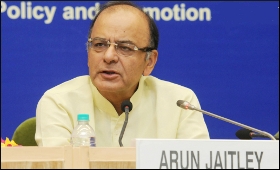|

|
'Achhe din' for govt staff, pensioners with massive hikes
|
|

|
|
| Top Stories |
 |
|
|
|
SME Times News Bureau | 30 Jun, 2016
A bonanza of 16 per cent pay hike and 24 per cent increase in pension, with arrears from January this year, awaits 47 lakh serving central government employees and 53 lakh pensioners with the Union Cabinet giving its approval to 7th Pay Commission recommendations on Wednesday.
But the government was undecided on giving the go-ahead to the massive 63 per cent hike in allowances which the pay panel had recommended.
A meeting of the Union Cabinet, presided over by Prime Minister Narendra Modi, gave its approval to the proposals, the immediate impact of which will be a whopping Rs 1.02 lakh crore (or over $15 billion) outgo from the government treasury during the current fiscal year.
"The government by and large accepted recommendations of the 7th Pay Commission and arrears will be paid this year," Finance Minister Arun Jaitley told reporters here at a briefing on the cabinet decisions.
"Salaries have to be respectable in order to attract the best talent," Jaitley said, terming the decision as a "historic rise" in the earnings for government employees.
The Finance Minister said salaries of government employees were now "distinctively higher" than private sector workers. As recommended by the pay panel, the minimum monthly salary for a central government employee has been fixed at Rs 18,000 from earlier Rs 7,000.
The maximum will now be Rs 2.5 lakh for the Cabinet Secretary, which is more than double the current pay of Rs 90,000 a month for the country's top bureaucrat. For other officers in the top scale -- secretary or equivalent, the monthly salary will now be around Rs 225,000.
The overall hike -- seen as having a cascading effect on salaries across the country, notably for states -- is estimated at 23.55 per cent: comprising an increase of 16 per cent in salary, 63 per cent in allowances and 24 per cent in pension, as recommended by the panel.
In monetary terms, the total outgo will comprise an estimated Rs 39,100 crore towards pay, Rs 29,300 crore in allowances and Rs 33,700 crore towards pension.
This apart, the impact on the general budget and the rail budget is estimated at Rs 73,650 crore and Rs 28,450 crore respectively.
The Finance Minister said the government has also doubled gratuity ceiling to Rs 20 lakh from the existing Rs 10 lakh. Housing loan allowance has been hiked to Rs 25 lakh from Rs 7.5 lakh.
With regard to allowances, Jaitley said till a final decision is taken by a panel headed by the Finance Secretary, all existing perks will be paid at the "existing rates".
He said the allowance panel will submit its report in four months. The pay panel had recommended to reduce the number of allowances from 196 to 51, and subsume 37 others into them.
On the flip side, the government is also targeting to increase revenue by bringing more under the tax net even as the large payout is likely to deplete its financial kitty. However, the massive extra financial burden during the current fiscal is also likely to boost consumer demand at a time the Indian economy appears slowing down.
Experts believe that the additional cash inflow despite fears of fuelling inflation may also trigger growth investment and savings.
For example, the implementation of the earlier Sixth Pay Commission had resulted in an expenditure of 0.77 percent of the GDP, which was Rs 56 lakh crore in 2008-09 when the last hikes came into effect.
The GDP growth that year was at 6.7 per cent while the world was reeling under financial crisis. The next two years, the GDP witnessed a growth at 8.6 per cent and 8.9 per cent -- largely due to the hikes in salary and pensions of existing and retired government employees.
Industry bodies Ficci, Assocham and CII welcomed the government decision that will boost the consumer demand and uplift the economic growth of the country. But they appeared worried about its impact on inflation and the country's fiscal deficit.
The 7th Pay Commission was set up on February 28, 2014, with Justice Ashok Kumar Mathur as Chairman, Vivek Rae as full-time Member, Ratin Roy as part-time Member, and Meena Agarwal as Secretary.
The final report was presented to the government on November 19 last year, following which the commission was wound up on December 31.
|
|
|
| |
|
|
|
|
|
|
|
|
|
|
|
|
|
|
| |
| Customs Exchange Rates |
| Currency |
Import |
Export |
US Dollar
|
66.20
|
64.50 |
UK Pound
|
87.50
|
84.65 |
Euro
|
78.25
|
75.65 |
| Japanese
Yen |
58.85 |
56.85 |
| As on 13 Aug, 2022 |
|
|
| Daily Poll |
 |
 |
| PM Modi's recent US visit to redefine India-US bilateral relations |
|
|
|
|
|
| Commented Stories |
 |
|
|
|
|
|
| |
|